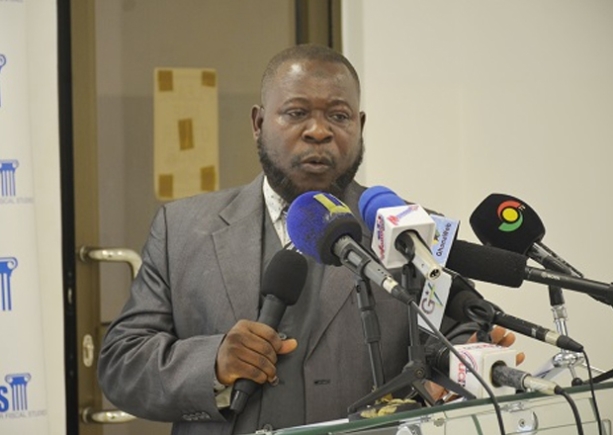
Revenue projections not in sync with reality — IFS
The Institute for Fiscal Studies (IFS) Ghana has cast doubts on the government's revised revenue projections for 2024, indicating that they were "out of sync with reality" and not achievable.
The government, in the mid-year budget review, revised its total revenue and grants target from GH¢176.41 billion (16.85 of GDP to GH¢177.22 billion (17.4% of GDP), an increase of 0.6 percentage points from the original 2024 budget projection of 16.8%.
This new target represents a 1.2 percentage point increase from the 2023 outturn of GH¢143.96 billion (16.2% of GDP).
Speaking at a press conference on Ghana’s current fiscal and macro-economic performance, the acting Executive Director of the IFS, Dr Said Boakye, said this projection was overly ambitious, citing historical data showing that the government had never been able to increase total revenue and grants by more than 0.5 percentage points of
GDP in any given year since 2017.
The institute had previously warned that even the original 1 percentage point increase projected in the original 2024 budget was unlikely to be achieved.
Dr Boakye said it was, therefore, surprising that this had been revised upwards to a 1.2 percentage points increase. Adding to the IFS skepticism, he noted that revenue performance in the first half of 2024 even fell short of targets.
Total revenue and grants came in at GH¢74.7 billion, missing the GH¢76.1 billion target by GH¢1.4 billion. Despite this underperformance, the government has, however, increased its full-year revenue projections.
On-oil-non tax revenue
Dr Boakye also questioned the Minister of Finance's assertion that the upward revision largely reflected an increase in Non-Oil Non-Tax Revenue.
He pointed out that non-oil non-tax revenue was only been revised upward by 0.1 percentage points of GDP, far short of the overall 0.6 percentage point increase in total revenue and grants projections.
He also highlighted that the revenue measures outlined in the Mid-Year Review do not appear significantly different from previous policies, raising doubts about their potential to drive such a substantial increase in revenue.
He said the institute's analysis also suggests that to meet the new target, the government would need to achieve an unprecedented 1.2 percentage point increase in total revenue and grants as a ratio of GDP in the second half of 2024 alone.
This projection stands in stark contrast to the historical second-half increases of 0.1 and 0.3 percentage points in 2022 and 2023, respectively.
How it compares with peers
A Graphic Business analysis indicates that Ghana's projection of a 1.2 percentage point increase in total revenues and grants in 2024 is more ambitious than most of its peers with similar economies in Africa, with most countries projecting increases of between 0.3 to 0.7 percentage points.
Kenya's total revenue to GDP ratio was estimated at 16.1% for the 2022/23 fiscal year.
The government projects this to increase to 16.8% in 2023/24 and 17.1% in 2024/25, showing a gradual increase compared to Ghana's projections.
Côte d'Ivoire's total revenue and grants also stood at 15.3% in 2023 and expected to increase to 15.8% in 2024, representing a more conservative projection.
Senegal's total revenue and grants also stood at 20.5% in 2023 and expected to increase to 20.7% in 2024, while Uganda also expects to grow its revenue-to-GDP ratio from 14.3% in 2023 to 15% in 2024.
Although most countries in the region are aiming to increase their revenue-to-GDP ratios, reflecting a common goal of improving domestic resource mobilisation, Ghana’s 1.2 percentage projected growth is more ambitious.
Concrete revenue measures
The IFS advised the government to adopt more concrete revenue policies and measures to increase revenue, as its policies so far have not led to a significant increase in revenue relative to GDP.
Dr Boakye said the government must first focus more on plugging revenue gaps by closing revenue leakages and improving collection.